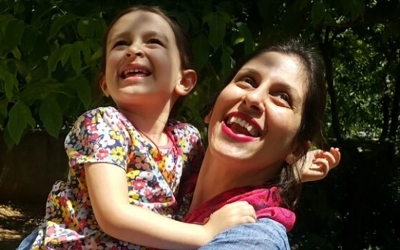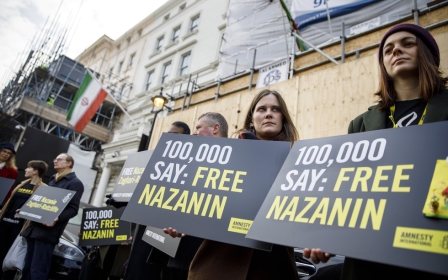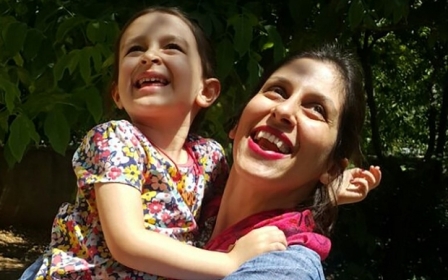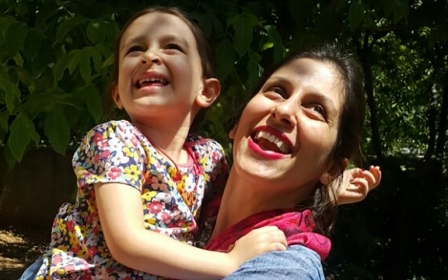UK to give jailed British-Iranian woman Zaghari-Ratcliffe diplomatic protection
Britain is to give jailed British-Iranian aid worker Nazanin Zaghari-Ratcliffe diplomatic protection in an attempt to put pressure on Iran to release her.
Foreign Minister Jeremy Hunt said resorting to a little-used way for governments to seek to protect their nationals was unlikely to be a "magic wand", but might help Zaghari-Ratcliffe's case.
But Iran's ambassador in London said the move "contravenes international law".
UK Foreign Minister Jeremy Hunt told BBC radio that Britain had not granted any individual diplomatic protection for over 100 years
Zaghari-Ratcliffe, a project manager with the Thomson Reuters Foundation, was arrested in April 2016 at a Tehran airport as she headed back to Britain with her daughter after a family visit.
She was sentenced to five years in jail after being convicted of plotting to overthrow Iran's clerical establishment, a charge denied by her family and the Foundation, a charity organisation that operates independently of Thomson Reuters and Reuters news.
The move means the case will now be treated as a formal, legal dispute between the countries and allow Britain to raise Zaghari-Ratcliffe's case more easily at international forums such as the United Nations.
"I have today decided that the UK will take a step that is extremely unusual, and exercise diplomatic protection," Hunt said in a statement on Thursday, adding that the move signalled to Tehran that "its behaviour is totally wrong".
"It is unlikely to be a magic wand that leads to an overnight result," he said.
"But it demonstrates to the whole world that Nazanin is innocent and the UK will not stand by when one of its citizens is treated so unjustly."
'Strong message to Iran'
Diplomatic protection is a mechanism under international law through which a state may seek reparation for injury to one of its nationals on the basis that the second state has committed an internationally wrongful act against that person.
It is not the same as diplomatic immunity, which is something given to diplomats to ensure their safe passage and protection from prosecution.
Hunt told BBC radio that Britain had not granted any individual diplomatic protection for over 100 years.
He said the move might improve consular access to Zaghari-Ratcliffe as Britain's ambassador in Tehran has not been able to see her, and could also improve her access to medical care.
In January, the Guardian newspaper reported she had been denied medical attention for lumps in her breasts and refused neurological care for neck pains and numbness in her arms and legs, despite being referred by the prison doctor for specialist treatment for both.
She has also been banned from seeing an outside psychiatrist, it said.
"It sends a very strong message to Iran: You are a great civilisation, you may have disagreements with the UK, but at the heart of this is an innocent woman, vulnerable, unwell and scared," Hunt said.
"She should not be paying the price for whatever disagreements you have with the UK."
Hunger strike
In January, Zaghari-Ratcliffe went on hunger strike for several days in protest at her treatment in jail.
Hunt was asked by BBC radio if he would now summon Iran's ambassador, take Iran to an international court, or impose sanctions.
"All these things are possible, but we would like to solve this in an amicable way," he said.
But Iran's ambassador was dismissive.
"UK Govt's extension of diplomatic protection to Ms Zaghari contravenes int'l law. Govts may only exercise such protection for own nationals," Hamid Baeidinejad tweeted.
"As UK Govt is acutely aware, Iran does not recognize dual nationality. Irrespective of UK residency, Ms Zaghari thus remains Iranian."
Middle East Eye propose une couverture et une analyse indépendantes et incomparables du Moyen-Orient, de l’Afrique du Nord et d’autres régions du monde. Pour en savoir plus sur la reprise de ce contenu et les frais qui s’appliquent, veuillez remplir ce formulaire [en anglais]. Pour en savoir plus sur MEE, cliquez ici [en anglais].






